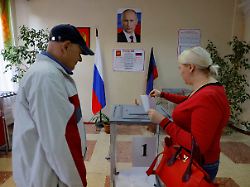Printing, exchanging papers, buying votes
Violations accompany Russian regional elections
September 9, 2023, 5:03 p.m
Listen to article
This audio version was artificially generated. More info | Send feedback
The opposition banned, expelled or locked away: Putin’s Russia has long been a long way from free elections. Observers are also complaining about fraud and other violations in the current regional elections. It is said that these are the least free elections since Putin took office.
Independent observers have already reported violations and fraud in many places in the regional elections in Russia scheduled for Sunday. For example, the organization Golos (in German: Voice) reported on Telegram about the pressure being exerted on voters and that Golos observers were sometimes not given access to voter rolls.
The organization has been branded a “foreign agent” for years and is a thorn in the side of the Russian power apparatus. Just a few weeks ago, its co-chair Grigory Melkonyants was arrested.
Independent Russian media such as the Medusa portal also reported violations in the elections, which will determine governors in 22 regions and regional parliaments in 16. For example, in the mayoral election in Moscow, members of the election commission are said to have exchanged ballot papers. There were reports of votes being bought in the city of Bratsk in Siberia.
In southern Russia, election observers are said to have been intimidated by being given summonses to military district replacement offices. In view of the massive repression against opposition members in Russia, independent observers describe the votes as the least free elections since the beginning of President Vladimir Putin’s rule around 24 years ago. After the traditionally most important election day on Sunday, the first results are expected on Monday night, according to the central electoral authority.
Election results in occupied territories not internationally recognized
Meanwhile, Putin cast his vote via online voting. “I call on the residents of the regions where elections are currently taking place to take part,” Putin said in a video distributed by the Kremlin, in which he is shown sitting in front of the computer in his office. The Kremlin chief also emphasized that he hoped that “each of you will show a responsible, civic attitude.”
A year and a half after the start of the war of aggression against Ukraine, the Kremlin also called mock elections in four annexed Ukrainian regions. However, the results of these ballots organized by the occupying power are not internationally recognized.
The Foreign Office in Berlin and the Ukrainian Foreign Ministry sharply criticized the local elections in the occupied Ukrainian territories. The “sham elections” are “nothing more than a transparent propaganda exercise,” explained the Foreign Ministry in Berlin on X, formerly Twitter. “We do not recognize Russia’s attempted land grab.” “Russia’s pseudo-elections” had “no value,” the Ukrainian Foreign Ministry said. It accused Moscow of a “gross violation” of its sovereignty.
